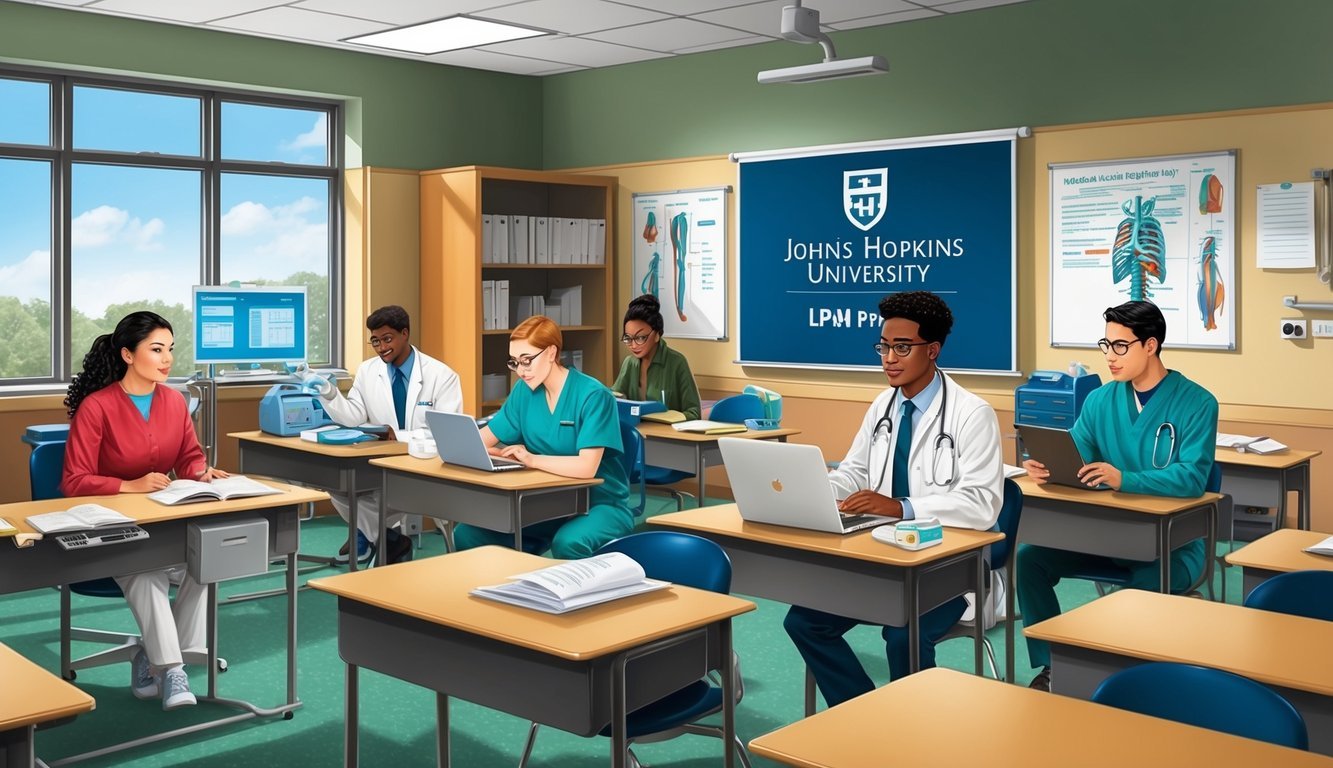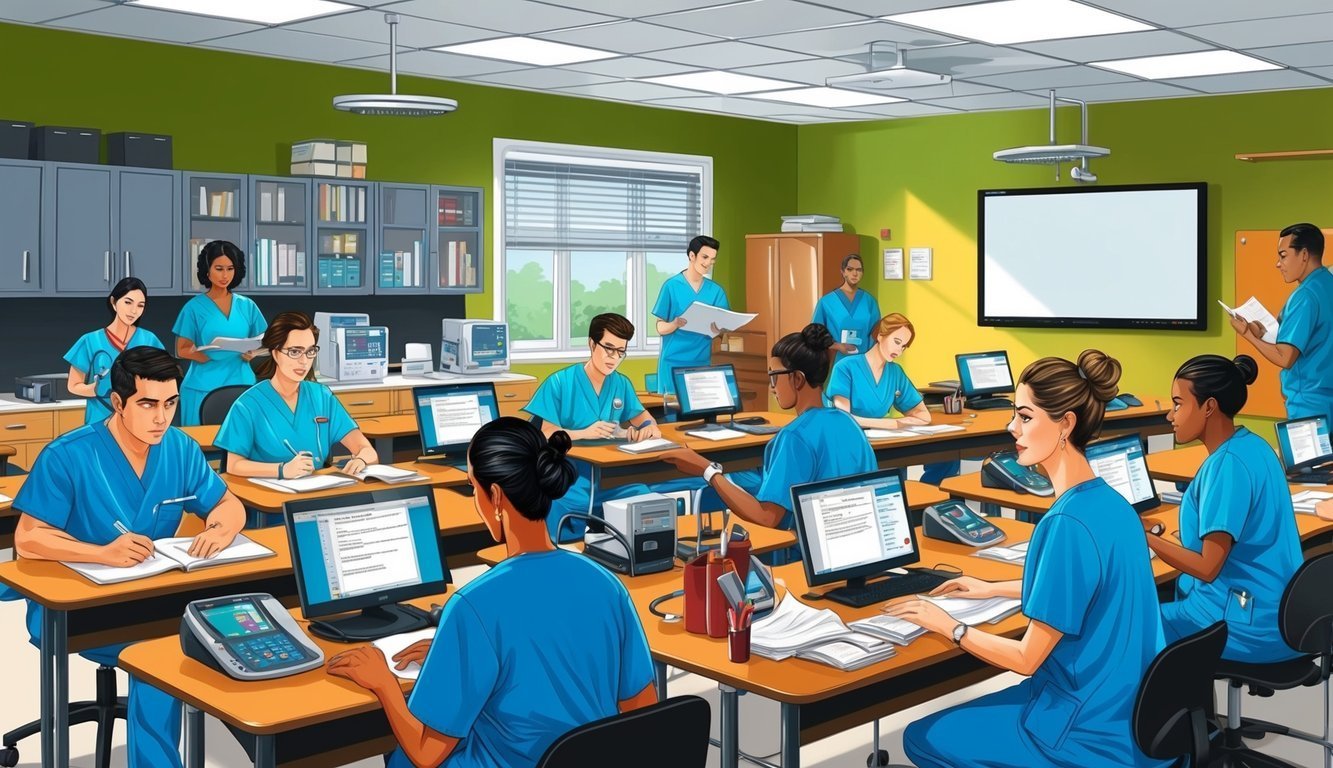Finding the right education path is crucial when pursuing a career as a Licensed Practical Nurse (LPN).
With numerous programs available, you must explore the best LPN programs near you to ensure a quality education that meets your professional goals.
Local programs can vary significantly in terms of curriculum, accreditation, and job placement rates.
By researching your options, you can identify the programs that align with your needs, including flexibility and financial considerations.
Johns Hopkins University LPN Program

Johns Hopkins University offers a robust program for aspiring Licensed Practical Nurses (LPNs).
This program is designed to equip you with essential skills in patient care, clinical practices, and nursing fundamentals.
You will benefit from a curriculum that emphasizes hands-on learning, clinical experience, and interdisciplinary collaboration.
The program is recognized for its commitment to diversity, equity, and inclusion in nursing education.
The LPN program typically includes coursework in anatomy, pharmacology, and nursing ethics.
Your training will also involve practical experiences in various healthcare settings, ensuring you are well-prepared for a nursing career.
Admission requirements generally include a high school diploma or equivalent, along with standardized test scores.
You can check specific details directly on the Johns Hopkins School of Nursing website to confirm the latest information on the program structure and application process.
Choosing Johns Hopkins means joining a globally recognized leader in nursing education.
You will have access to a wealth of resources and support to help you succeed in your nursing career.
2) Duke University School of Nursing LPN
Duke University School of Nursing offers robust programs for those pursuing a Licensed Practical Nurse (LPN) certification.
This program is designed to equip you with the necessary skills for a successful nursing career.
Duke emphasizes rigorous training and evidence-based practice.
You will benefit from a curriculum that is both comprehensive and tailored to meet the current demands of the healthcare industry.
The environment at Duke fosters interdisciplinary collaboration.
You will have opportunities to engage with a network of healthcare professionals, enhancing your learning experience.
For more information on admissions requirements and curriculum details, visit the Duke University School of Nursing website.
Exploring your options at this respected institution can help shape your nursing career positively.
3) University of Pennsylvania – LPN

The University of Pennsylvania offers a competitive Licensed Practical Nurse (LPN) program designed to equip you with essential nursing skills.
The curriculum emphasizes a blend of theoretical knowledge and practical application.
Key features of the program include:
| Feature | Description |
|---|---|
| Accreditation | Approved by recognized nursing accreditation bodies |
| Hands-on Training | Clinical experience in various healthcare settings |
| Small Class Sizes | Personalized attention from faculty |
| Strong NCLEX Pass Rates | Historical data shows a high first-time pass rate |
The program focuses on patient care, communication, and ethical considerations in nursing.
You will engage in both classroom learning and clinical practice, enhancing your readiness for the nursing field.
With a prestigious reputation, the University of Pennsylvania prepares you to succeed as a licensed practical nurse.
Explore more about the program here.
Columbia University School of Nursing – LPN

Columbia University offers a reputable nursing education that prepares you for a career as a Licensed Practical Nurse (LPN).
The program emphasizes both theoretical knowledge and practical skills essential for nursing.
You will learn from experienced faculty in an engaging environment.
The curriculum is designed to equip you with the skills needed to provide high-quality patient care.
Columbia’s commitment to research enhances your educational experience, allowing you to stay informed about the latest advancements in nursing.
Participation in research projects is encouraged, preparing you for future challenges in healthcare.
Additionally, Columbia’s location provides access to diverse clinical placements, enriching your practical training.
You will gain hands-on experience in various healthcare settings, reinforcing classroom learning.
For more details on admission requirements and curriculum, you can visit the Columbia University School of Nursing.
This program is a strong choice for anyone looking to advance their nursing career in a prestigious institution.
5) Emory University LPN Program

Emory University does not offer a specific Licensed Practical Nurse (LPN) program.
Instead, the institution focuses on Bachelor of Science in Nursing (BSN) and advanced nursing programs.
If you are looking for practical nursing credentials, consider exploring options at local community colleges or technical schools that offer LPN training programs.
These programs typically provide comprehensive coursework and clinical experience essential for a successful career in nursing.
The Emory University Nell Hodgson Woodruff School of Nursing is recognized for its advanced nursing education and high rankings.
Their BSN program is designed for students wishing to pursue a registered nursing career rather than LPN certification.
Investigate nearby nursing programs that align with your career goals, taking into account factors such as location, accreditation, and program length to find the best fit for your needs.
6) University of California, San Francisco LPN

The University of California, San Francisco (UCSF) offers a robust pathway for aspiring Licensed Practical Nurses (LPNs).
The program emphasizes evidence-based practice and clinical excellence.
UCSF’s nursing curriculum is designed to integrate advanced healthcare practices.
You’ll benefit from innovative teaching methods and interdisciplinary collaboration with healthcare professionals.
The faculty consists of leaders in the nursing field, ensuring you receive guidance from experienced practitioners.
Upon completion, graduates are well-prepared for LPN licensure and various nursing roles.
UCSF is consistently recognized among the top nursing schools in the nation.
Engaging in this program allows you to gain essential skills and knowledge needed for a successful nursing career.
For more information on the program and admissions, visit the UCSF School of Nursing.
7) University of North Carolina, Chapel Hill LPN
The University of North Carolina at Chapel Hill does not offer a dedicated LPN program.
Instead, it provides a comprehensive Bachelor of Science in Nursing (BSN) program, which prepares you for a career as a registered nurse.
If you’re interested in pursuing an LPN pathway, consider looking at local community colleges or vocational schools.
Many of these institutions offer practical nursing programs that can be completed in a year or less.
UNC School of Nursing is recognized for its strong academics and reputable faculty.
The program emphasizes innovative teaching methods and interprofessional education, ensuring you receive a well-rounded education.
Upon completion of an LPN program elsewhere, you may also look into bridging programs that can help you advance to a BSN, allowing for greater career opportunities and responsibilities in nursing.
You can explore more about the nursing programs and opportunities at the University of North Carolina, Chapel Hill.
Additionally, resources like Nurse.org can help compare nearby LPN programs.
8) New York University Rory Meyers College of Nursing LPN
New York University Rory Meyers College of Nursing offers one of the prominent nursing programs in New York.
While NYU primarily focuses on advanced nursing degrees, it offers pathways for aspiring Licensed Practical Nurses (LPNs).
The college provides comprehensive education that combines clinical experience with theoretical learning, essential for your development as a healthcare professional.
You gain hands-on skills through various clinical placements, ensuring that you are well-prepared for the job market.
NYU is recognized for its commitment to excellence in nursing education.
The program emphasizes leadership and policy, preparing you for diverse roles in healthcare.
You will be equipped to face the challenges of modern nursing.
If you’re considering enrolling in a reputable program, you can explore more about NYU’s offerings in nursing.
More details about admissions and curriculum can be found on the NYU Rory Meyers College of Nursing Admissions page.
The nursing programs at NYU are accredited, ensuring that you receive quality education that meets industry standards.
Be sure to check their specific LPN options as you plan your education path.
University of Michigan LPN Program
The University of Michigan offers a comprehensive approach to nursing education.
While they primarily focus on Bachelor of Science in Nursing (BSN) programs, their curriculum effectively prepares students for various nursing roles.
You can explore their nursing programs through a blend of theoretical knowledge and clinical experiences.
This ensures you develop skills needed for patient care across all stages of life.
The program emphasizes evidence-based practices, crucial for modern healthcare.
You will engage in simulations and hands-on training to enhance your learning.
If you are considering pathways into practical nursing, resources like PracticalNursing.org can provide additional insights.
You will find details about the program structure, cost, and potential career outcomes.
Moreover, check the University of Michigan-Flint School of Nursing for updated information, admission requirements, and application procedures.
Their commitment to nursing education ensures you receive quality training in every aspect of nursing care.
10) University of Washington School of Nursing LPN
The University of Washington offers a robust nursing program, emphasizing quality education and clinical experience.
The program is designed to prepare you for licensure as a practical nurse.
You will benefit from a curriculum that blends theory with hands-on training.
This approach ensures you develop the necessary skills to excel in various healthcare settings.
Classes are taught by experienced faculty, providing mentorship and guidance throughout your studies.
Additionally, the university has strong partnerships with local healthcare facilities, enhancing your clinical opportunities.
The admissions process is competitive, and you will need to meet specific requirements to apply.
Keep in mind that the program also emphasizes the importance of patient-centered care, equipping you to handle diverse patient needs effectively.
For more detailed information about the University of Washington School of Nursing, consider visiting their official site.
You can find FAQs, program details, and application guidelines that will aid in your decision-making process.
Accreditation and Licensing Requirements
Understanding the essential accreditation and licensing requirements is crucial for aspiring LPNs.
Accreditation ensures that your chosen program meets specific educational standards, while licensing is necessary to practice as a nurse in your state.
Importance of Accreditation
Accreditation represents recognition that a nursing program meets or exceeds the standards set by relevant regulatory bodies.
Attending an accredited program assures you of receiving a quality education, which significantly impacts your career opportunities.
Here are key benefits of accreditation:
- Enhanced Credibility: Employers often prefer candidates from accredited programs.
- Financial Aid: Federal and state financial aid may only be available for accredited institutions.
- Transfer Credits: If you plan to continue your education, accredited programs facilitate the transfer of credits to higher-level nursing degrees.
To check the accreditation status of a program, refer to the Council on Occupational Education or the Accreditation Commission for Education in Nursing (ACEN).
State Licensing Requirements
Each state’s board of nursing mandates specific licensing requirements.
After you complete your LPN training, you must pass the NCLEX-PN exam to obtain a license.
Key steps generally include:
- Complete an Accredited Program: Finish an accredited LPN program.
- Pass the NCLEX-PN: This exam tests your knowledge and skills in nursing.
- Submit Application: File your application with the state board along with any necessary documents.
- Background Check: Most states require a criminal background check.
It’s essential to verify your state’s requirements as they can vary.
Visit your state’s nursing board website for specific details about the licensing process.
Curriculum Overview
The curriculum for Licensed Practical Nurse (LPN) programs encompasses essential nursing courses and practical experiences to prepare you for a successful career.
Understanding these core elements is vital for making informed decisions about your education.
Core Nursing Courses
In LPN programs, you will engage in a series of core nursing courses designed to provide a comprehensive foundation in healthcare.
Common subjects include:
- Anatomy and Physiology: Understand the human body’s systems and functions.
- Fundamentals of Nursing: Learn essential nursing practices and patient care techniques.
- Pharmacology: Study medication administration and safe drug usage.
- Nutrition: Explore dietary needs and healthy eating habits in patient care.
These courses typically combine theoretical knowledge with necessary skills.
Students often benefit from interactive learning experiences, such as simulations, which can enhance your understanding of real-world nursing scenarios.
This structured curriculum prepares you for both the challenges of nursing and the NCLEX-PN licensure exam.
Practical Experience and Clinical Rotations
Practical experience is a critical component of LPN training.
Most programs require you to complete clinical rotations in various healthcare settings, such as hospitals, nursing homes, or clinics.
During these rotations, you’ll:
- Work Under Supervision: Collaborate with registered nurses and other healthcare professionals.
- Apply Theory to Practice: Implement skills learned in core courses in real patient interactions.
- Foster Patient Care Skills: Gain experience in monitoring vital signs, assisting with daily activities, and providing emotional support.
These hands-on experiences not only solidify your nursing knowledge but also help develop your confidence in patient care.
By the end of your program, you will be equipped with both theoretical and practical skills needed to excel in the nursing field.
Career Opportunities for LPN Graduates
Licensed Practical Nurses (LPNs) have diverse career opportunities in various settings, along with options for advancement and specialization.
Understanding these pathways can help you shape a fulfilling nursing career.
Employment Settings
As an LPN, you can find employment in multiple environments.
Common settings include:
- Hospitals: Work on medical-surgical units, maternity wards, or emergency departments.
- Nursing Homes: Provide daily care for elderly residents, often managing medications and monitoring health.
- Home Health Care: Assist patients in their homes, requiring strong communication skills and independence.
- Clinics: Support doctors in outpatient settings, performing basic procedures and patient education.
Each environment offers unique experiences, allowing you to select a setting that aligns with your interests.
For instance, LPNs in home health care often build close patient relationships, while those in hospitals work on varied, fast-paced teams.
Explore opportunities in your area, such as those listed on platforms like Indeed.
Advancement and Specialization Paths
LPNs have several options to further their careers.
You may choose to specialize in areas such as:
- Pediatrics: Care for infants and children, requiring special knowledge of growth and development.
- Geriatrics: Focus on elderly patients, addressing their specific health needs.
- Mental Health: Work in facilities that support individuals with psychological issues.
You can also advance your education by pursuing an LPN to RN bridge program, enabling you to become a Registered Nurse.
This transition often results in increased responsibilities and higher pay.
Options for continuing education can also lead to roles in nursing education or healthcare administration.

